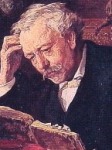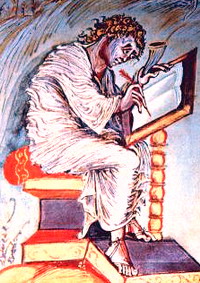The Inkhorn Controversy and Composition in a Digital Age
A few weeks ago, I attended the NJCEA spring conference and made a presentation. I should have known just by the other presentation titles with their thesis-style titles (colons & sub-titles are very popular) that my own presentation might be out of place. I adhered to the title style. Mine was "Open Everything: How the Open Source Movement Will Change Writing." But there were very few "presentations" that day.
It's a type of conference that I haven't attended in at least eight years: one where people read their papers to you. Even the opening keynote (Canons That Define Canons: Thoreau and Others) by Dr. Edward Foster, a professor at Stevens Institute of Technology, was a 45 minute reading. There's a place for this type of conference format, but its one that has become a foreign country to me.
As I sat in the first session listening to three papers being read on "Material Culture in American Literature," I started thinking about the panel I was part of in the next session. The collective title for us was "Writing and the New Media: Composition in a Digital Age." There would be a presentation done live in Second Life about Hawthorne's The House of the Seven Gables that is one of the virtual worlds projects at Seton Hall University. Chris Funkhouser from NJIT would show examples of his recent research into digital poetry and his new book Prehistoric Digital Poetry: An Archaeology of Forms. My presentation was equally techie as I planned to talk about how the open everything philosophy that embraces the read/write of Web 2.0 and collaboration is changing writing.
I had eyed the audience during the opening keynote and there were a good number of grad students and young professors in attendance. As the readers read their papers, I started thinking, "We might get an overflow crowd in our session because people might be looking for a change of pace from the scholarly papers being read to them."
I was very wrong. Our session was only half full.
 Though I had asked in two earlier posts here for readers to contribute to my presentation, I didn't expect the NJCEA crowd to participate as I doubted that many of them would be readers of this blog. What I didn't expect was that they would be very cool, even a bit hostile, to my ideas about writing changing.
Though I had asked in two earlier posts here for readers to contribute to my presentation, I didn't expect the NJCEA crowd to participate as I doubted that many of them would be readers of this blog. What I didn't expect was that they would be very cool, even a bit hostile, to my ideas about writing changing.
I was talking about writing for the web, but not without thinking about traditional pen/keyboard to paper. I was mostly concerned with how we now "publish" and present our writing now.
I mentioned in my talk that I thought that in 25 years (I was being conservative - it's more likely half that), there will be no literary journals in print form. That didn't go over well. If you publish a paper there today, like the ones being read at the conference, you might have a handful of readers. Subscribers? Mostly academic libraries who are cutting more & more of those paper titles.
Interestingly, at the conference people were reading the papers aloud. It's almost a podcast. Perhaps, they should be podcasts. I suspect some might actually find a new audience that way.
Maybe.
Dr. Norbert Elliot, who was the convener of our session, is a friend from my NJIT days. Last year, I helped him with a podcast series called "The End of the Essay."
We posted it to iTunes U and created a wiki for comments and collaboration.
He sent out links to colleagues in the humanities. The comments he did get came in personal emails. They wouldn't use the wiki. And they were not generally happy with his premise. The END of the essay?
 "The Inkhorn Controversy" refers to a very old debate among English scholars over whether the English language should eliminate Latin and Greek words and embrace its Anglo-Saxon roots. It was in full force between the mid-16th to the mid-17th centuries at the time of the transition between Middle English and Modern English. (You can download a paper on it, if you are so inclined.) Was English learned enough as a language to adequately describe complex scientific, philosophical, legal and theological concepts?
"The Inkhorn Controversy" refers to a very old debate among English scholars over whether the English language should eliminate Latin and Greek words and embrace its Anglo-Saxon roots. It was in full force between the mid-16th to the mid-17th centuries at the time of the transition between Middle English and Modern English. (You can download a paper on it, if you are so inclined.) Was English learned enough as a language to adequately describe complex scientific, philosophical, legal and theological concepts?
I don't think we have exactly the same situation now, but the debate today might be whether or not these digital tools can adequately replace the essay and the paper it is printed on.
I believe they can and that they will. I think that some rhetoricians from 16th century might actually agree with me. The Arte of Rhetorique in 1553 was "opposed to pedantry of phrase, and above all to a revival of uncouth medieval forms of speech." I think Tom might want to use a blog or wiki were he with us today.
Let me end with a question from that podcast series: What would happen if the essay were abolished in education? The podcast series was intended to be a trial balloon. We wanted to see, with your online help, what way the wind is blowing. We still do.
Comments
No comments